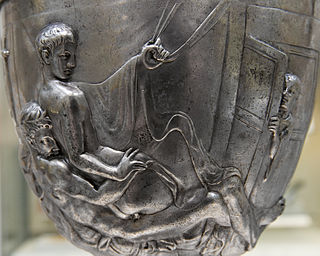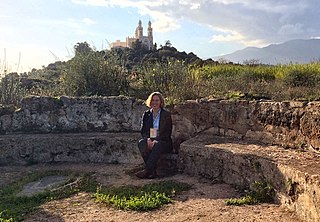
Lesbian, gay, bisexual, and transgender (LGBT) movements are social movements that advocate for LGBT people in society. Although there is not a primary or an overarching central organization that represents all LGBT people and their interests, numerous LGBT rights organizations are active worldwide. The first organization to promote LGBT rights was the Scientific-Humanitarian Committee, founded in 1897 in Berlin.

Queer is an umbrella term for people who are not heterosexual or are not cisgender. Originally meaning 'strange' or 'peculiar', queer came to be used pejoratively against LGBT people in the late 19th century. Beginning in the late 1980s, queer activists, such as the members of Queer Nation, began to reclaim the word as a deliberately provocative and politically radical alternative to the more assimilationist branches of the LGBT community.

The LGBT community is a loosely defined grouping of lesbian, gay, bisexual, and transgender individuals united by a common culture and social movements. These communities generally celebrate pride, diversity, individuality, and sexuality. LGBT activists and sociologists see LGBT community-building as a counterweight to heterosexism, homophobia, biphobia, transphobia, sexualism, and conformist pressures that exist in the larger society. The term pride or sometimes gay pride expresses the LGBT community's identity and collective strength; pride parades provide both a prime example of the use and a demonstration of the general meaning of the term. The LGBT community is diverse in political affiliation. Not all people who are lesbian, gay, bisexual, or transgender consider themselves part of the LGBT community.

LGBT history dates back to the first recorded instances of same-sex love and sexuality of ancient civilizations, involving the history of lesbian, gay, bisexual, and transgender (LGBT) peoples and cultures around the world. What survives after many centuries of persecution—resulting in shame, suppression, and secrecy—has only in more recent decades been pursued and interwoven into more mainstream historical narratives.

The Warren Cup is an ancient Greco-Roman silver drinking cup decorated in relief with two images of male same-sex acts. It was purchased by the British Museum for £1.8 million in 1999, the most expensive single purchase by the museum at that time. It is usually dated to the time of the Julio-Claudian dynasty.

Gay literature is a collective term for literature produced by or for the gay community which involves characters, plot lines, and/or themes portraying male homosexual behavior.
Over the course of its history, the LGBT community has adopted certain symbols for self-identification to demonstrate unity, pride, shared values, and allegiance to one another. These symbols communicate ideas, concepts, and identity both within their communities and to mainstream culture. The two symbols most recognized internationally are the pink triangle and the rainbow flag.

LGBT themes in horror fiction refers to sexuality in horror fiction that can often focus on LGBTQ+ characters and themes within various forms of media. It may deal with characters who are coded as or who are openly LGBTQ+, or it may deal with themes or plots that are specific to gender and sexual minorities.

Bisexual erasure, also called bisexual invisibility, is the tendency to ignore, remove, falsify, or re-explain evidence of bisexuality in history, academia, the news media, and other primary sources.
Peter Meineck is Professor of Classics in the Modern World at New York University. He is also the founder and humanities program director of Aquila Theatre and has held appointments at Princeton University and University of South Carolina.

Pederasty or paederasty is a sexual relationship between an adult man and a boy. It was a socially acknowledged practice in Ancient Greece and Rome and elsewhere in the world, such as Pre-Meiji Japan.
The history of lesbian, gay, bisexual and transgender people in Ireland.
Jenifer Neils is an American classical archaeologist and was from July 2017 to June 2022 director of the American School of Classical Studies at Athens. Formerly she was the Elsie B. Smith Professor in the Liberal Arts in the Department of Classics at Case Western Reserve University.

Juana María Rodríguez is a Cuban-American professor of Ethnic Studies, Gender and Women's Studies, and Performance Studies at the University of California, Berkeley. Her scholarly writing in queer theory, critical race theory, and performance studies highlights the intersection of race, gender, sexuality and embodiment in constructing subjectivity.

Nancy Sorkin Rabinowitz is a classical scholar, specialising in ancient Greek literature and intersectional feminism.

Catherine Mary Conybeare is an academic and philologist and an authority on Augustine of Hippo. She is currently Leslie Clark Professor in the Humanities at Bryn Mawr College in Pennsylvania.
Ruby Blondell is Professor Emerita of Classics and Adjunct Professor Emerita of Gender, Women, & Sexuality Studies at the University of Washington; prior to retirement, they were the Byron W. and Alice L. Lockwood Professor of Humanities also at the University of Washington. Their research centres on Greek intellectual history, gender studies, and the reception of ancient myth in contemporary culture.
Mary Ann Eaverly is Professor of Classics at the University of Florida known for her work on Archaic Greek sculpture.
James Snyder (1928–1990) was an American art historian, specializing in northern Renaissance art. His Northern Renaissance Art of 1985 was a standard textbook on the subject for several decades, with a posthumous revised edition in 2005, revised by Larry Silver and Henry Luttikhuizen, being somewhat replaced by Jeffrey Chipps Smith's The Northern Renaissance of 2004. Snyder taught at Bryn Mawr College from 1964 until his retirement in 1989. He died of liver disease in August 1990, aged 62.
Deborah Kamen is Chair and Professor of Classics at the University of Washington. Her research is on Greek cultural and social history, with a particular focus on ancient slavery.










